Resident Referral Letter
[Your Name]
[Your Address]
[City, State, ZIP Code]
[Email Address]
[Phone Number]
[Today's Date]
[Apartment Complex Name]
[Property Manager's Name]
[Apartment Complex Address]
[City, State, ZIP Code]
Subject: Resident Referral Letter
Dear [Property Manager's Name],
I hope this letter finds you well. I am writing to recommend a potential new resident for our wonderful community at [Apartment Complex Name]. I have had the pleasure of residing in this community for [duration of your tenancy], and I must say that it has been an exceptional experience thus far.
The individual I am referring is [Prospective Resident's Name]. I have known them for [how long you've known the prospective resident] and can confidently say that they possess all the qualities that would make them an outstanding addition to our community. [Briefly mention their positive attributes, such as friendly nature, responsible behavior, etc.]
Having lived here for quite some time, I can attest to the sense of community and security that our complex offers. The management team has always been prompt in addressing any concerns, and the maintenance staff is diligent in ensuring the property is well-maintained. The amenities provided, such as [mention amenities like gym, pool, common areas, etc.], are also major highlights that make living here truly enjoyable.
I believe that [Prospective Resident's Name] will not only enjoy the benefits of living in our community but will also contribute positively to its atmosphere. I have already discussed the benefits of our complex with them, and they are genuinely excited about the prospect of joining us.
If possible, I kindly request that you give [Prospective Resident's Name] special consideration during the application process. I am certain that their presence will enhance our community further.
Thank you for your time and attention. If you require any additional information or have any questions, please do not hesitate to contact me at [Your Phone Number] or [Your Email Address].
Warmest regards,
[Your Name]
Medical Specialist Referral Letter
Subject: Patient Referral for Specialized Care
Dear Dr. [Specialist Name],
I am writing to refer my patient, [Patient Name] (DOB: [Date]), for evaluation and management of [specific condition/concern]. The patient has been under my care since [date] and presents with [detailed symptoms/findings].
Current medications include [list medications and dosages]. Recent diagnostic tests show [relevant results]. The patient's medical history is significant for [relevant conditions].
I believe your expertise in [specialty area] would be invaluable in determining the most appropriate treatment plan. Please see the attached medical records and test results for your review.
Thank you for your consideration of this referral. I look forward to your recommendations and continued collaborative care.
Sincerely,
Dr. [Your Name]
[Title/Department]
[Contact Information]
Housing Authority Referral Letter
Subject: Resident Referral for Housing Services
To Whom It May Concern:
This letter serves as a formal referral for [Resident Name], who currently resides at [Current Address]. Due to [specific circumstances], I am recommending this individual for [type of housing assistance/services].
The resident has demonstrated [positive qualities/circumstances] and would benefit from [specific services]. Their current housing situation requires attention due to [detailed explanation of need].
Supporting documentation includes [list attachments]. The resident meets the eligibility criteria for [specific program/assistance] based on [qualifying factors].
I strongly recommend your consideration of this referral and am available for any additional information you may require.
Respectfully,
[Your Name]
[Title/Position]
[Organization]
[Contact Information]
Mental Health Services Referral Email
Subject: Urgent Referral for Mental Health Support
Dear [Mental Health Provider],
I hope this email finds you well. I am reaching out to refer [Resident/Client Name] for mental health services. This individual has been experiencing [brief description of concerns] and would greatly benefit from professional support.
Recent observations indicate [specific behaviors/symptoms]. The resident has expressed [their feelings/willingness to seek help]. Family history includes [relevant information if applicable].
This referral is being made with the resident's full consent and understanding. They are particularly interested in [type of therapy/support preferred] and are available for appointments [availability].
Time is of importance in this matter, and I would appreciate your earliest consideration. Please let me know if you need any additional information.
Warm regards,
[Your Name]
[Position]
[Contact Information]
Educational Support Services Referral Message
Subject: Student Referral for Academic Support Services
Dear Academic Support Team,
I am writing to refer [Student Name] for specialized academic support services. This student has been demonstrating [academic challenges/needs] and would benefit from additional resources.
Current academic performance shows [specific details]. The student excels in [strengths] but struggles with [areas of concern]. Previous interventions have included [what has been tried].
The student is motivated to improve and has expressed interest in [specific support services]. Their learning style appears to be [visual/auditory/kinesthetic] based on classroom observations.
I believe your intervention services would make a significant difference in this student's academic journey. Please schedule an assessment at your earliest convenience.
Best regards,
[Your Name]
[Title]
[School/Institution]
[Contact Information]
Social Services Referral Letter
Subject: Referral for Social Services Assessment
Dear Social Services Department,
This formal referral is submitted for [Individual/Family Name] who requires immediate assessment for social services. The current situation involves [detailed circumstances requiring intervention].
The individual/family has been [brief background]. Current living conditions include [housing situation]. Income sources are [employment/benefits status]. Children in the home are [ages and any special needs].
Immediate concerns include [safety/welfare issues]. The referred party has [consented/been informed] of this referral and understands the process ahead.
Priority should be given to this case due to [urgency factors]. All relevant documentation is attached for your review.
Thank you for your prompt attention to this matter.
Officially submitted,
[Your Name]
[Title/Agency]
[Case Number if applicable]
[Contact Information]
Employment Services Referral Email
Subject: Job Placement Referral
Hello [Employment Counselor Name],
I am pleased to refer [Individual Name] to your employment services program. This individual is actively seeking employment and possesses [relevant skills/qualifications].
Their work history includes [brief employment background]. They have completed [education/training/certifications]. Their career interests lie in [preferred industries/roles].
Current challenges to employment include [barriers if any]. However, their strengths include [positive attributes]. They are available for [full-time/part-time] positions and can work [schedule flexibility].
The individual is highly motivated and committed to finding stable employment. They would benefit from [specific services like resume help, interview coaching, job matching].
Please contact them directly at [phone/email] to schedule an initial appointment.
Best wishes,
[Your Name]
[Organization]
[Contact Information]
Substance Abuse Treatment Referral Letter
Subject: Referral for Substance Abuse Treatment
Dear Treatment Coordinator,
I am writing to refer [Individual Name] for substance abuse treatment services. This referral is made with urgency due to [specific circumstances].
The individual has been struggling with [substance/addiction] for [duration]. Previous treatment attempts include [prior interventions]. Current support system consists of [family/friends/resources].
Medical considerations include [health issues related to substance use]. The individual has expressed [willingness/resistance] to treatment and understands [legal/personal consequences].
Preferred treatment modality would be [inpatient/outpatient/specific program]. Insurance coverage is [details] and financial arrangements may need discussion.
This individual requires immediate intervention. Please prioritize this referral and contact me with next steps.
Respectfully,
[Your Name]
[Title]
[Agency/Organization]
[Emergency Contact Information]
Legal Aid Services Referral Message
Subject: Referral for Legal Assistance
Dear Legal Aid Attorney,
I am referring [Client Name] to your legal aid services for assistance with [legal matter]. This individual requires immediate legal representation due to [circumstances].
The case involves [brief description of legal issue]. Current status is [pending court date/ongoing situation]. The individual has [attempted self-representation/has no legal counsel].
Financial situation confirms eligibility for legal aid services based on [income/asset information]. All relevant documentation will be provided upon request.
Time sensitivity requires your prompt attention as [deadline/court date] approaches. The individual is available for consultation [availability].
Please confirm receipt of this referral and advise on next steps for scheduling.
Sincerely,
[Your Name]
[Title]
[Organization]
[Contact Information]
What is a Resident Referral Letter and Why is it Needed
A resident referral letter is a formal or semi-formal document that connects individuals living in residential settings with appropriate services, resources, or specialists. These letters serve as professional recommendations that help residents access healthcare, social services, housing assistance, educational support, employment services, legal aid, or other community resources. The primary purpose is to facilitate smooth transitions between service providers and ensure residents receive comprehensive care tailored to their specific needs.
Who Should Write and Send Resident Referral Letters
- Case managers and social workers in residential facilities
- Healthcare providers including doctors, nurses, and mental health professionals
- Housing coordinators and property managers
- Educational administrators and counselors
- Community outreach workers
- Religious leaders and community advocates
- Legal guardians or appointed representatives
- Family members when appropriate and authorized
Recipients of Resident Referral Letters
- Medical specialists and healthcare providers
- Mental health counselors and therapists
- Social service agencies and departments
- Housing authorities and assistance programs
- Educational institutions and support services
- Employment centers and job placement agencies
- Legal aid organizations and attorneys
- Substance abuse treatment facilities
- Community resource centers
- Government assistance programs
When to Send Resident Referral Letters
- When residents require specialized medical care beyond current provider capabilities
- During housing crises or when transitioning to new living arrangements
- When academic or behavioral support is needed in educational settings
- Upon identification of mental health concerns requiring professional intervention
- When residents express interest in employment or vocational training
- During legal issues requiring professional legal representation
- When substance abuse problems are identified and treatment is necessary
- During family crises or child welfare concerns
- When residents age out of current programs or services
- In emergency situations requiring immediate intervention
Requirements and Prerequisites Before Sending Referrals
- Obtain proper consent from the resident or legal guardian
- Gather all relevant documentation and records
- Verify recipient organization accepts referrals from your type of facility
- Confirm resident meets eligibility criteria for requested services
- Complete any required intake forms or preliminary assessments
- Ensure contact information for all parties is current and accurate
- Check insurance coverage or funding sources for services
- Coordinate timing to avoid conflicts with existing appointments or obligations
- Prepare resident for what to expect from the referral process
Formatting Guidelines for Effective Referral Letters
- Keep letters between 200-500 words for most situations
- Use professional letterhead when representing an organization
- Include clear subject lines that identify the purpose
- Start with proper salutations appropriate to the relationship
- Present information in chronological order when relevant
- Use bullet points for multiple items or complex information
- Include specific dates, times, and contact information
- Attach relevant documentation rather than summarizing extensively
- End with clear next steps and your availability for follow-up
- Proofread carefully for accuracy and professionalism
Follow-up Actions After Sending Referral Letters
- Confirm receipt of the referral by the receiving organization
- Follow up within 48-72 hours for urgent referrals
- Track appointment scheduling and attendance
- Maintain communication with both resident and service provider
- Document all referral activities in resident files
- Prepare for potential requests for additional information
- Monitor outcomes and effectiveness of the referral
- Be prepared to make alternative referrals if needed
- Continue coordinating care between multiple service providers
- Update referral information if circumstances change
Common Mistakes to Avoid When Writing Referrals
- Failing to obtain proper consent before making referrals
- Providing insufficient or vague information about the resident's needs
- Not including current contact information for all parties
- Sending referrals to inappropriate or unqualified providers
- Waiting too long to make urgent referrals
- Not following up to ensure the referral was received and processed
- Including confidential information without proper authorization
- Using inappropriate tone or unprofessional language
- Not preparing the resident for what to expect
- Failing to coordinate with existing service providers
Essential Elements and Structure of Referral Letters
- Clear subject line identifying the referral purpose
- Proper date and recipient information
- Professional greeting appropriate to relationship
- Brief introduction identifying yourself and your role
- Resident identification (name, age, case number if applicable)
- Specific reason for referral with supporting details
- Relevant background information and history
- Current situation or circumstances
- Specific services or interventions being requested
- Timeline or urgency indicators
- Contact information for follow-up questions
- Professional closing and signature
- List of attachments or enclosed documents
Advantages and Disadvantages of Written Referrals
Pros:
- Creates official documentation of the referral process
- Provides detailed information that may be lost in verbal communication
- Establishes professional relationships between organizations
- Helps ensure residents receive appropriate and timely services
- Creates accountability for both sending and receiving parties
Disadvantages:
- Can be time-consuming to write properly
- May delay urgent referrals if immediate action is needed
- Requires administrative follow-up and tracking
- May not convey urgency as effectively as phone calls
- Could create privacy concerns if not handled properly
Professional Tips and Best Practices
- Build relationships with common referral recipients before you need them
- Keep templates for frequently used referral types but customize each one
- Use secure email or encrypted systems for sensitive information
- Call ahead for urgent referrals to ensure prompt attention
- Maintain a referral tracking system to monitor outcomes
- Ask receiving organizations about their preferred referral format
- Include your direct contact information for quick follow-up
- Consider the resident's preferences and cultural considerations
- Be honest about challenges while highlighting strengths
- Keep copies of all referrals for your records and reporting requirements
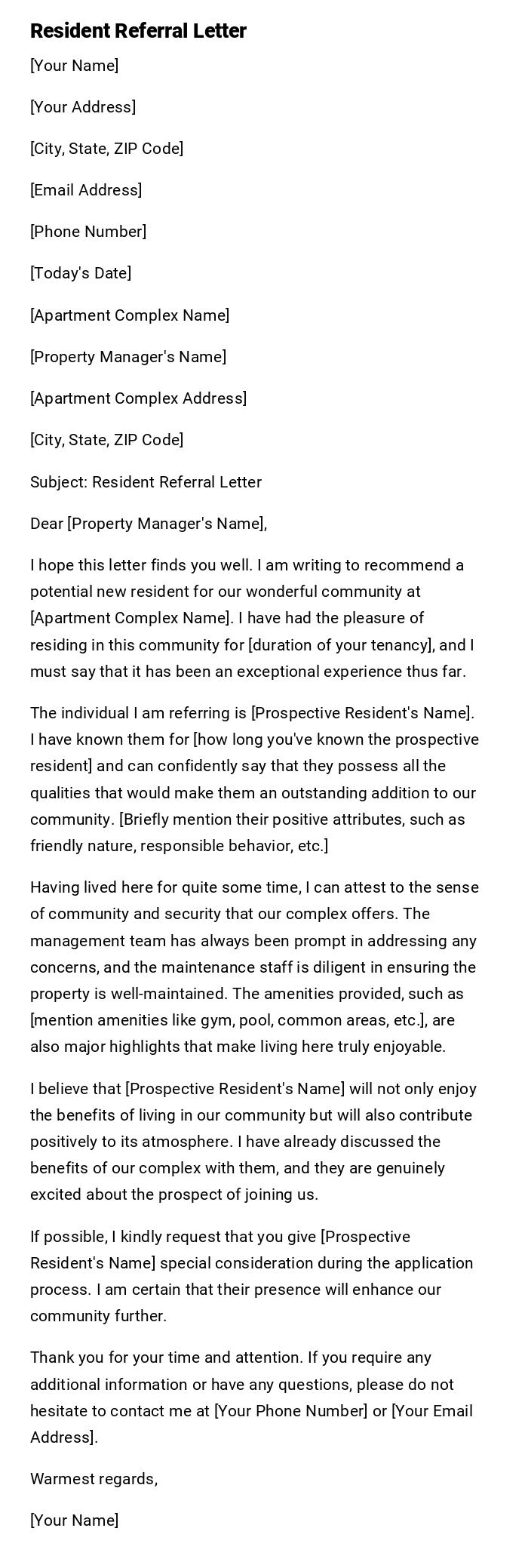
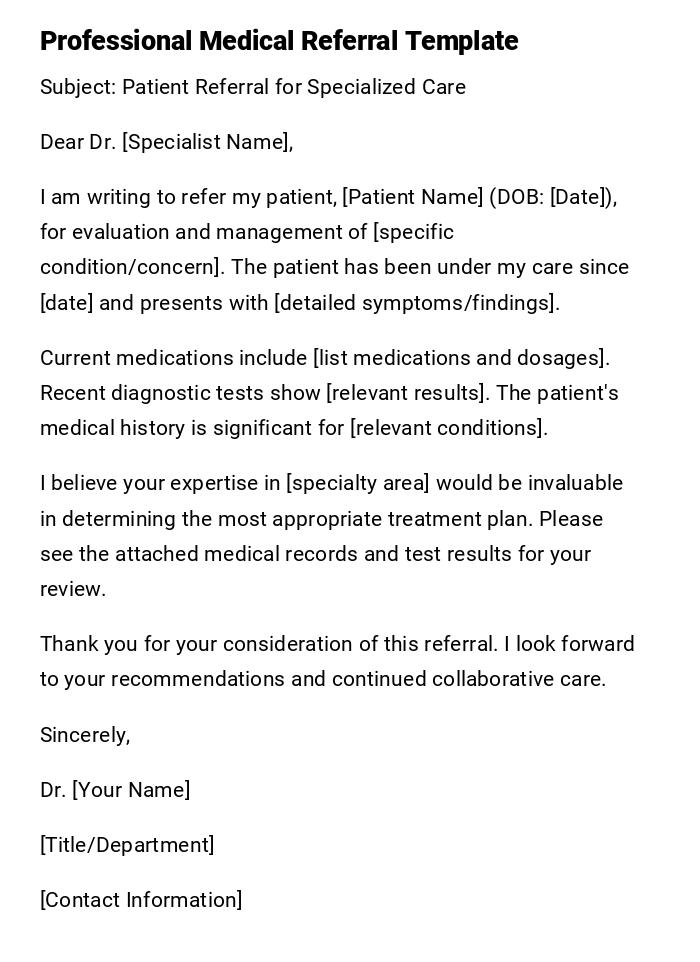
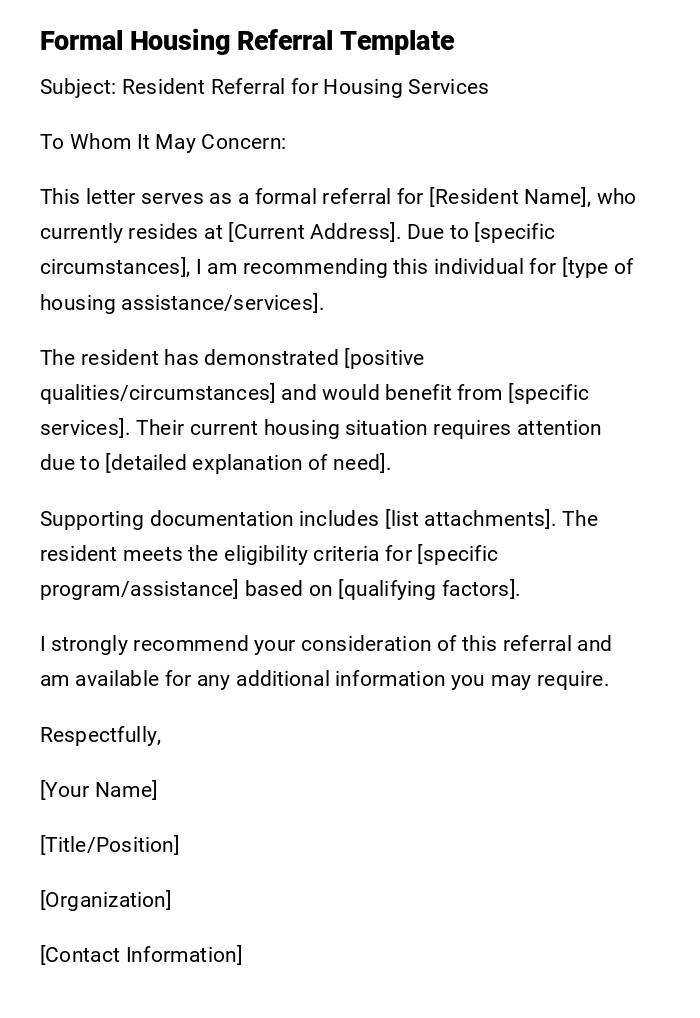
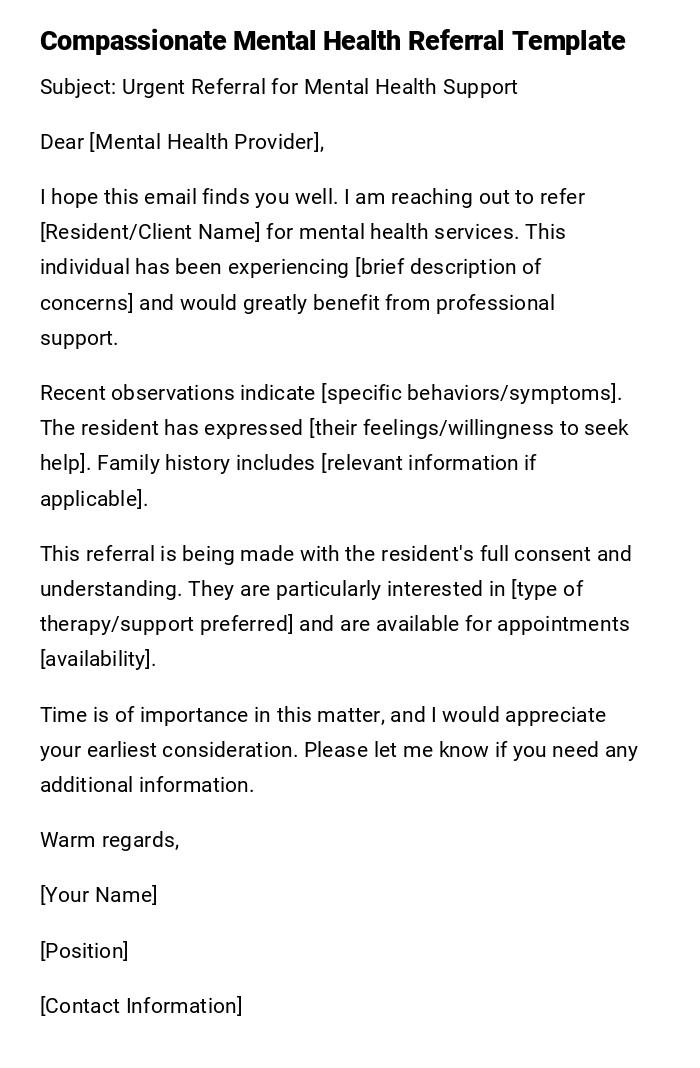
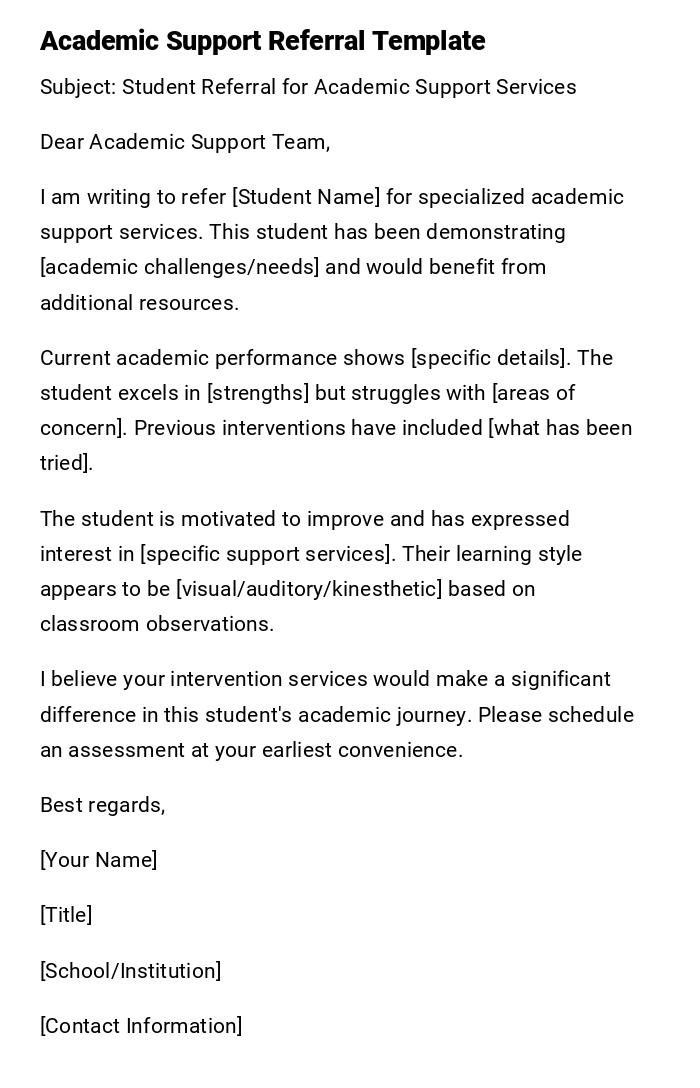
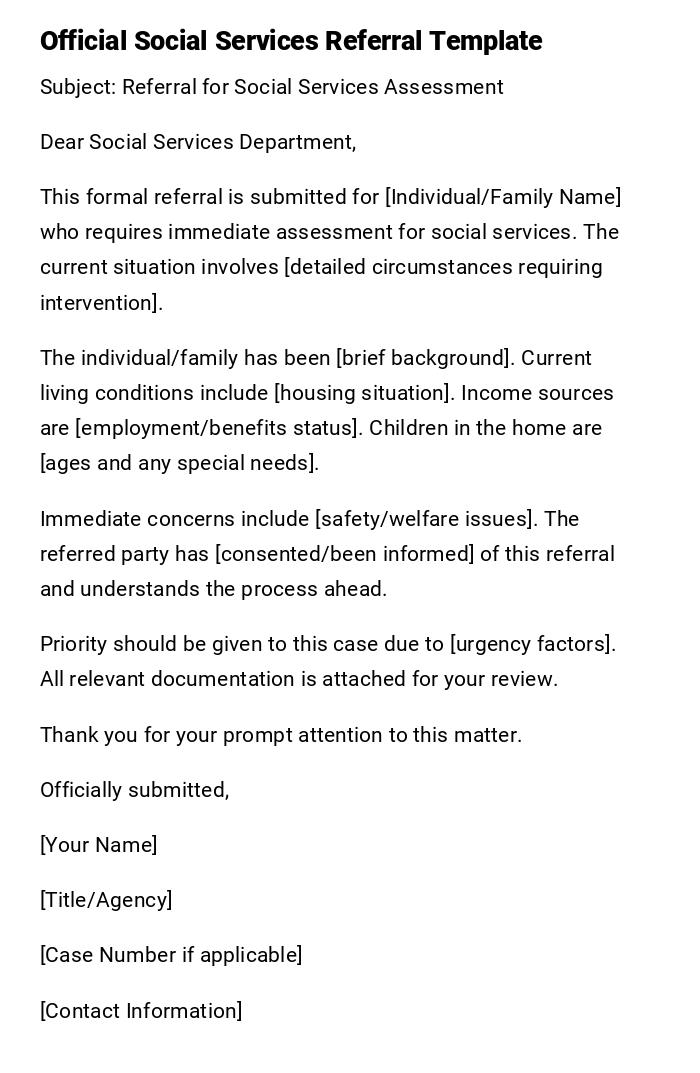
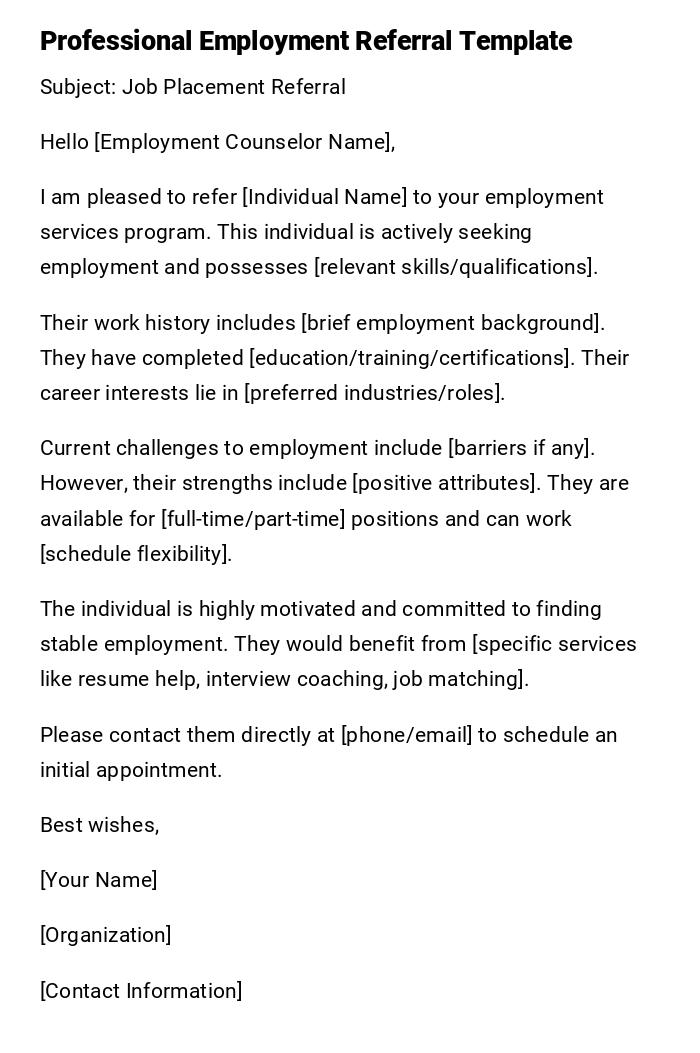
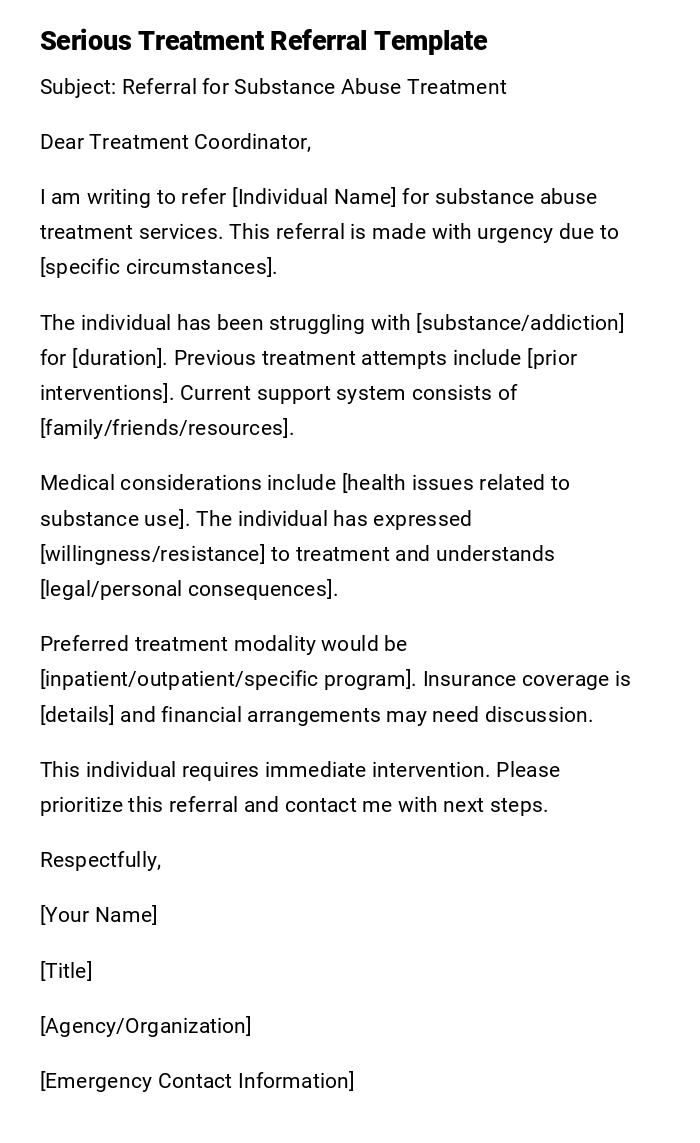
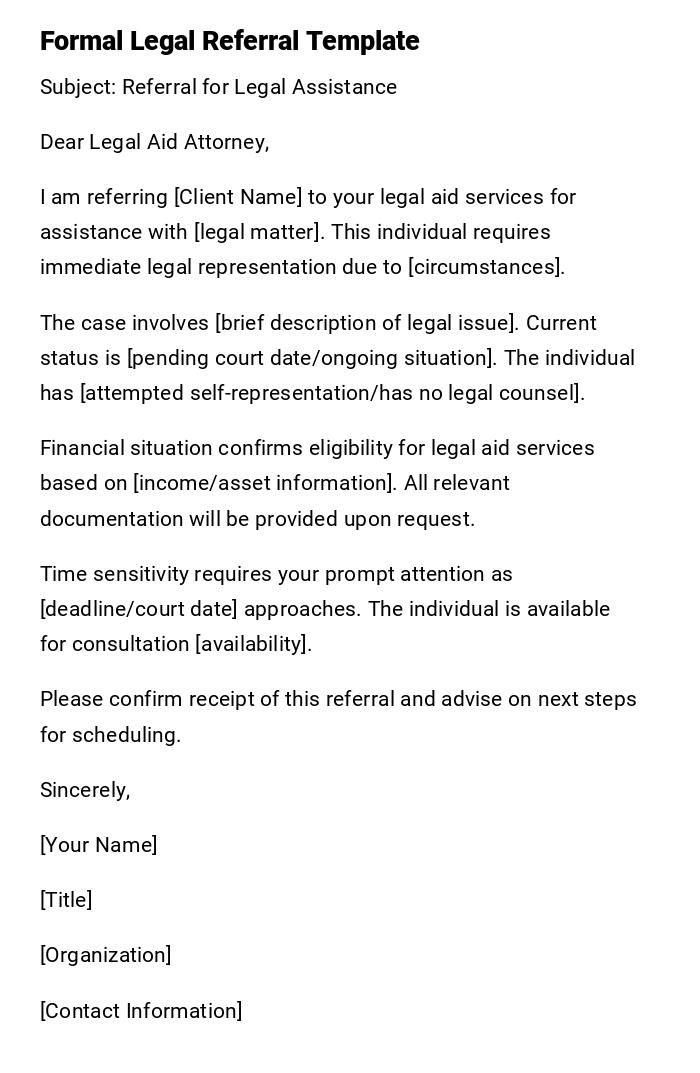

 Download Word Doc
Download Word Doc
 Download PDF
Download PDF